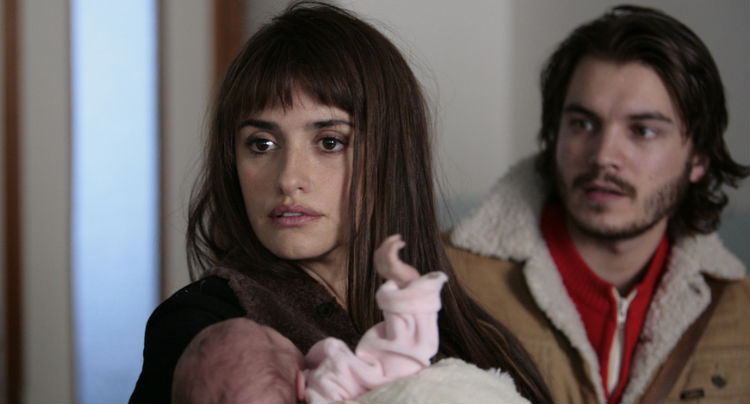
An overwrought romantic melodrama featuring two actors turning in sick-day performances.

An overwrought romantic melodrama featuring two actors turning in sick-day performances.
Sergio Castellitto’s adaptation of his wife Margaret Mazzantini’s novel, Twice Born is an overwrought romantic melodrama set in the Bosnian conflict that features two fine actors turning in sick-day performances. The Italian actor-turned-director fails to draw anything substantial out of his stars Penelope Cruz (who he worked with on his previous film, Don’t Move, another adaptation of a Mazzantini novel) and Emile Hirsch, though the unbelievably phony dialog would stumble up even the best of thesps. The egregious absence of chemistry between the leads is damaging enough to sink the film by itself, but unfortunately the problems don’t stop there.
The mostly English-language picture employs both a present-day storyline and lengthy flashbacks in the life of Gemma (Cruz), an Italian with a suspiciously Spanish-sounding accent. Cruz shows the occasional glimmer of her greatness in the role, but she’s capable of so much more. In the flashbacks, Gemma falls for Diego (Hirsch), a globetrotting American photographer who’s one of those loud, grating, hyper-optimistic types that thinks he’s more charming and funny than he is. Hirsch’s forced enthusiasm is only magnified by the borderline-idiotic dialog. “The world’s going to hell, baby. And we’re going down with it.” The age disparity between Cruz and Hirsch is distracting (he’s got a baby face), especially when talks of starting a family arise.
As Sarajevo crumbles around Gemma and Diego, so does their relationship, a metaphor that would be effective if only it were handled with more integrity. The distasteful depiction of the siege of Sarajevo is at times reprehensibly insensitive; at one point a young man is gunned down in the streets while and his friend sentimentally says that “he fell like an artist.” Really? The conflict serves as a manipulative backdrop for the couple’s relationship, and though the script tries desperately to make the metaphor work, it feels shoehorned and iffy at best, resulting in a jumbled narrative. It’s also never clarified what caused all of the chaos. Who’s firing at who, and why? More insight into the origin of the siege would have been appreciated.

In the present-day storyline, a middle-aged Gemma, invited by her old friend Gojko (Adnan Haskivic, a handsome cheeseball), returns to Bosnia, where her son, Pietro (Pietro Castellitto) was born. The angsty 16-year-old finds the idea of exploring his origins repulsive, and wants nothing to do with the memory of his biological father. At this point the story devolves into a “who’s the daddy?” mystery, and while the revelations late in the film are shocking, the road to get there is arduous and drawn-out (the 2 hour running time feels inflated.)
Supporting players Haskivic and Saadet Aksoy (whose character is a key factor in Gemma and Diego’s downfall) surprisingly out-act the leads, exuding the free-wheeling spunk and charisma Hirsch is grasping so desperately for. Thankfully, they both get a significant amount of screen time, which softens the blow of Hirsch and Cruz’s awkward encounters (the love scenes are laughable.)
Another notable strength of the film is the slick imagery, courtesy of DP Gianfilippo Corticelli, who uses slow-motion shots stylishly and appropriately (a sequence with Cruz dancing in a puddle as Hirsch photographs her is stunning.) The recreation of Sarajevo by art designer Francesco Frigeri is equally staggering and beautiful. It’s a shame the rest of the team didn’t hold up their end of the bargain.